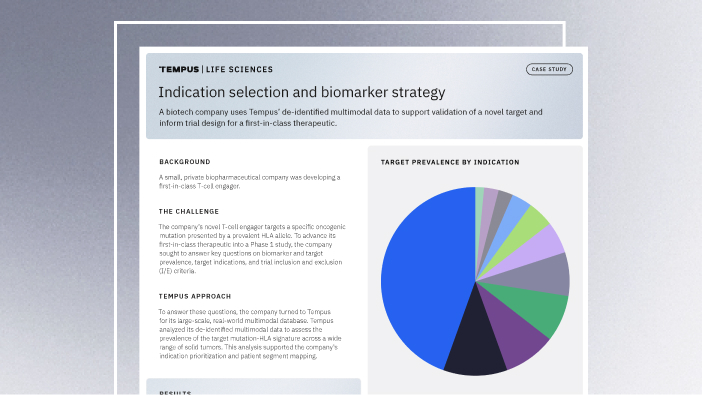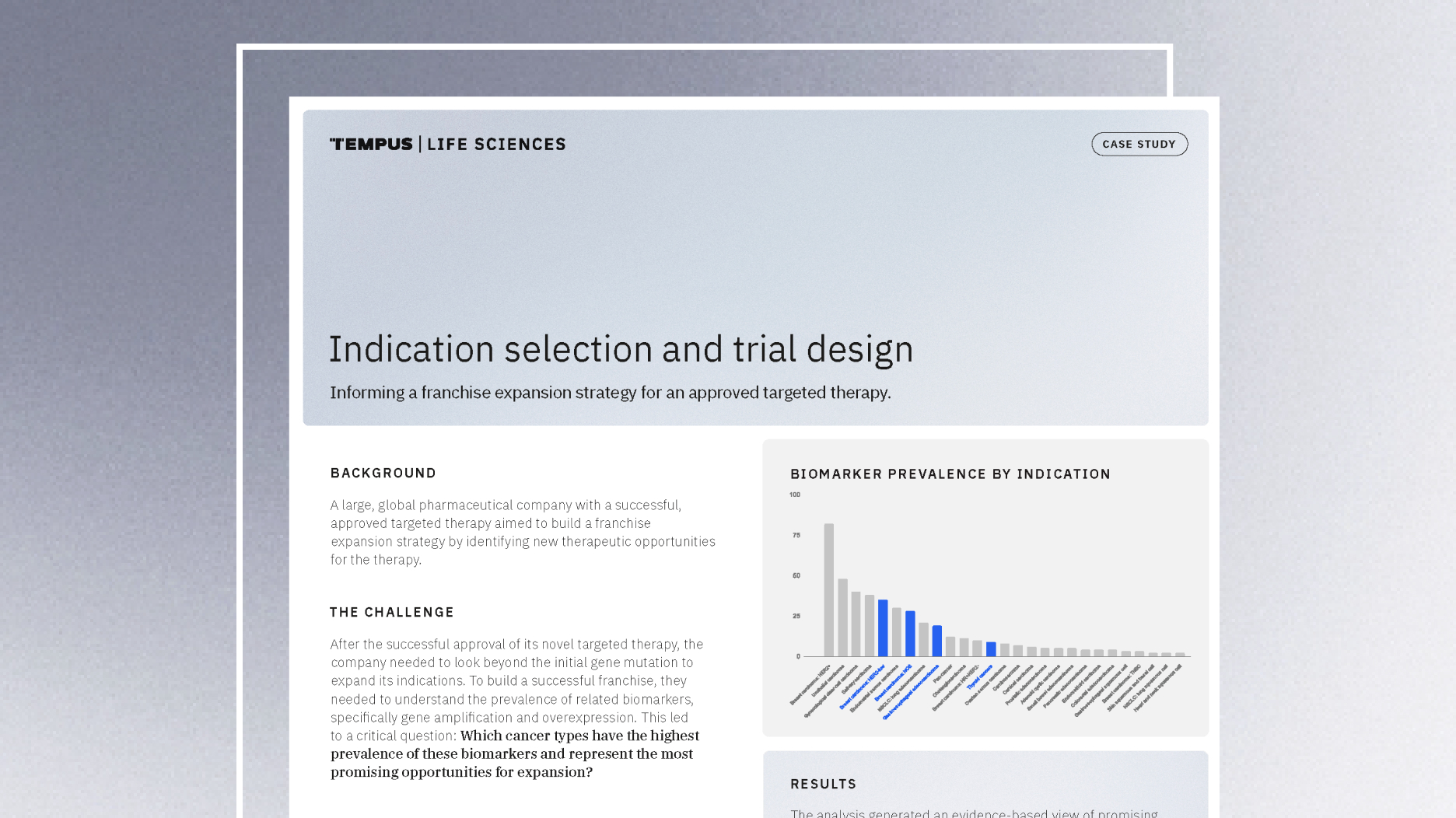-
PROVIDERS
New MRD Medicare Coverage for Select Indications*
*When coverage criteria are met. Additional criteria and exceptions for coverage may apply.
-
LIFE SCIENCES
ENROLL NOW
Tempus’ patient-derived organoid screens
Evaluate the efficacy of your preclinical compounds using fixed organoid panels designed for diverse therapeutic applications -
PATIENTS
It's About Time
View the Tempus vision.
- RESOURCES
-
ABOUT US
View Job Postings
We’re looking for people who can change the world.
- INVESTORS
10/04/2022
Top 8 takeaways from the ESMO Congress 2022
Check out the latest on personalized medicine’s continued progress with this overview of new evidence from key trials, by Tempus’ Dr. Calvin Chao.
Authors
Calvin Chao, MD
Senior Vice President, Medical Affairs, Tempus

Senior Vice President, Medical Affairs, Tempus

Academic experts, oncology providers, and industry leaders gathered in Paris at the European Society for Medical Oncology (ESMO) Congress 2022 from September 9 through 13 to discuss the latest results from oncology trials and to connect in person. Overall, this year’s conference presentations highlighted the continued progress of personalized medicine driven by new evidence on therapeutic outcomes in biomarker-defined subgroups of patients from key trials.
Here are the top 8 takeaways from the meeting:
- Long-term overall survival (OS) updates from two ovarian cancer trials underscore the importance of BRCA mutations and homologous recombination deficiency (HRD) status.
- Positive data supports broader use of immunotherapy for patients with advanced cervical cancer regardless of PD-L1 status.
- Favorable results on the use of neoadjuvant vs. adjuvant immunotherapy for patients with resectable melanoma and mismatch repair deficient (dMMR) colon cancers were encouraging.
- 5-year overall survival updates from two immunotherapy-chemotherapy trials in metastatic NSCLC confirm sustained long-term benefits from pembrolizumab combined with chemotherapy.
- The competition for KRAS inhibitors continues to evolve with varying success across cancer indications.
- Interim data demonstrates patient benefits of lower dose trastuzumab deruxtecan (T-DXd) for HER2-mutated metastatic non-small cell lung cancer (NSCLC).
- Regulatory T-cells (T-reg) targeting anti-CD25 monoclonal antibodies (mAbs) reemerge as an exciting immunotherapy prospect.
- Data on how an AI-driven algorithmic test brings additional clarity to cancer of unknown primary (CUP) patient management.
Long-term OS updates from two ovarian cancer trials underscore the importance of BRCA mutations and HRD status
Positive long-term data from two phase III olaparib maintenance therapy trials in newly diagnosed advanced ovarian cancer patients were reported at ESMO:
- After seven years of follow up, the SOLO-1 trial (NCT01844986; n=391) in BRCA-mutated advanced ovarian cancer patients showed clinically meaningful OS improvements with maintenance olaparib (median OS not reached) vs. placebo (75.2 mo), (HR 0.55, p=0.0004).
- Final OS data from PAOLA-1 trial (NCT02477644; n=806) in patients previously responding to platinum-based chemotherapy + bevacizumab showed median OS of 56.5 mo with maintenance olaparib + bevacizumab vs 51.6 months with bevacizumab alone (HR 0.92, p=0.4118) in the overall population of all comers.
- Of interest, an exploratory analysis found OS prolonged with olaparib + bevacizumab in the HRD+ subgroup (mOS 54% vs 48%, HR 0.62; 95% CI 0.45-0.85). For mOS in HRD+ and BRCA mutation patients: HR 0.60; 95% CI 0.39-0.93. For HRD+ patients without BRCA mutation: HR 0.71; 95% CI 0.45-1.13. No benefit in OS was seen in HRD-negative patients.
Positive data supports broader use of immunotherapy for patients with advanced cervical cancer regardless of PD-L1 status
Among women globally, cervical cancer is the fourth most prevalent cancer. At ESMO 2022, there were several studies that published positive data related to the use of immunotherapy to treat advanced cervical cancer patients.
- Updated data from Bristol Myers Squibb’s phase I/II Checkmate-358 clinical trial with nivolumab and an nivolumab combination with the CTLA-4 inhibitor ipilimumab suggested positive responses to immune checkpoint inhibitors regardless of PD-L1 status in recurrent or metastatic cervical cancer. Median OS was 21.6 months for the nivolumab monotherapy, and 15.2 and 20.9 months for the two combination therapy dosages, respectively.
- Final OS results from the Regeneron, phase III EMPOWER-Cervical 1 trial for recurrent or metastatic cervical cancer progressing after 1L platinum-based chemotherapy demonstrated that patients receiving the PD-L1 inhibitor cemiplimab had significantly reduced risk of death by 34% in the overall population compared to investigators’ choice of single-agent chemotherapy. The benefit was observed regardless of PD-L1 status.
- DNA vaccines in combination with PD-L1 inhibitors also demonstrate some success in overall response rate (ORR). The single-arm phase II study involving a combination of Genexine’s GX-188E, a therapeutic DNA vaccine for non-resectable HPV-16 and/or HPV-18-positive cervical cancer, and pembrolizumab showed significant efficacy with an ORR of 31.7% overall (19 of 60 patients, including 6 CR, 13 PR). Of note, in the 24 PD-L1 negative patients, ORR was 25.0%.
Favorable results on the use of neoadjuvant vs. adjuvant immunotherapy for patients with resectable melanoma and dMMR colon cancers were encouraging
Several studies presented at ESMO evaluated the treatment regime and timing of administration of both neoadjuvant and adjuvant therapies.
- In a Presidential Symposium, the S1801 study by the SWOG Cancer Research Network outlined how patients with high-risk melanoma who received three doses of neoadjuvant pembrolizumab with surgery followed by 15 doses of adjuvant pembrolizumab had a significantly longer event-free survival compared to similar patients who received 18 doses of adjuvant pembrolizumab after surgery (HR 0.58; p=0.004).
- These findings support the use of neoadjuvant pembrolizumab in high-risk melanoma patients before surgery.
- This treatment regime appears to encourage an immune response while leaving the bulk of the melanoma and the antitumor T-cells intact. However, larger studies will need to confirm this finding.
- The Presidential Symposium also reported highly encouraging results from the NICHE-2 trial of neoadjuvant nivolumab and ipilimumab in non-metastatic dMMR colon cancer, with major pathologic response and pCR achieved in 95% and 67% of patients, respectively (along with a standing ovation). Further data on 3-yr disease-free survival, a key co-primary endpoint along with safety, are still pending.
5-year overall survival updates from two immunotherapy-chemotherapy trials in metastatic NSCLC confirm sustained long-term benefits from pembrolizumab combined with chemotherapy
- The KEYNOTE-189 and KEYNOTE-407 studies in metastatic non-squamous and squamous NSCLC, respectively, demonstrated continued overall survival benefits at 5 years for pembrolizumab when added to chemotherapy in the first-line treatment setting.
- PD-L1 is a good prognostic biomarker for both KEYNOTE-189 and KEYNOTE-407 with the best survival in the PD-L1>50% groups for squamous and nonsquamous NSCLC for pembrolizumab treated patients; however, PD-L1 was less prognostic in chemotherapy-only treated squamous cell patients in KEYNOTE-407. In both studies, all patients showed OS and PFS benefit from pembrolizumab when combined with chemotherapy irrespective of PD-L1 status, though small PD-L1 subgroups may limit some analyses.
- Of the patients (n=57 and 55 respectively) who completed 2 years of therapy (35 cycles) in both studies, about 70% are alive at 3 years.
- Both studies affirm a strong foundational role for pembrolizumab in leading to durable responses and longer-term overall survival benefits in mNSCLC.
The competition for KRAS inhibitors continues to evolve with varying success across cancer indications
ESMO Congress 2022 was expected to be another interesting platform for KRAS inhibitor developers Mirati and Amgen.
- The late entry of Amgen’s NSCLC Codebreak-200 phase 3 confirmatory study data was an exciting addition to ESMO’s presidential session. The Codebreak-200 study (NCT04303780; N=345) in patients with KRAS G12C-mutated mNSCLC who had progressed after prior platinum chemotherapy and immunotherapy met its primary endpoint of improving progression-free survival with sotorasib vs docetaxel (HR 0.66; p=0.002), though it demonstrated a similar OS between the two arms.
- However, it should be noted that the study was not powered for OS, especially with a protocol amendment that reduced enrollment size from 650 to ~330 per regulatory guidance, and that crossover to sotorasib was allowed.
- Outside of NSCLC, Mirtati’s adagrasib appears to have the edge in other solid tumors, reporting an ORR in colorectal cancer of 46%, in combination with Eli Lilly’s cetuximab, an EGFR mAb, whilst Amgen’s sotorasib delivered a 30% ORR in a combo study with Amgen’s EGFR mAb panitumumab.
- However, KRAS G12C mutations are expressed in just ~3-4% of colorectal cancer cases, and ~2% of pancreatic cancer cases (according to Mirati’s research).
Interim data demonstrates patient benefits of lower dose T-DXd for HER2-mutated metastatic NSCLC
Assessments of activity and safety profiles are often warranted to optimize different drug doses for specific patient populations.
- In the DESTINY-Lung01 study (NCT03505710; N=181), T-DXd 6.4 mg/kg showed durable clinical activity in previously treated HER2m NSCLC; however drug-related interstitial lung disease (ILD) occured in 26% of patients.
- Koichi Goto, director, National Cancer Center Hospital East in Japan, presented interim findings from the randomized phase 2 DESTINY-Lung02 study (NCT04644237; N=152), which evaluated the safety and efficacy of a lower drug dose of T-DXd in HER2-mutated metastatic NSCLC: 5.4 vs. 6.4 mg/kg Q3W. While longer evaluation is required for patient observation, T-DXd at 5.4 mg/kg demonstrated clinically meaningful responses with a more favorable safety profile including lower rates of ILD.
- Hence, the immediate patient benefits of the lower dose were demonstrated: lower cost, reduced adverse events, and clinically meaningful efficacy. Notably, on August 11, 2022, T-DXd received accelerated approval by Food and Drug Administration (FDA) for the treatment of patients with unresectable or metastatic NSCLC whose tumors have activating HER2 mutations, as detected by an FDA-approved test, and who have received previous systemic therapy based on the DESTINY-Lung02 study.
T-reg targeting anti-CD25 mAbs reemerge as exciting immunotherapy prospect
T-regs serve as immunosuppressive agents, inhibiting activation of effector T-cells. Recent studies have shown that higher levels of tumor infiltrating T-regs can lead to adverse events in patients undergoing cancer treatment. T-reg cells express high amounts of CD-25, which is the high affinity subunit of IL-2R. Anti-CD25 mAbs were initially developed to target T-reg cells for antibody-dependent cellular cytotoxicity (ADCC), however they were initially unsuccessful and removed from the majority of clinical development pipelines due to a lack of clinical benefit derived from inhibition of IL-2/IL-2R interactions in effector cells also.
- At ESMO, a preclinical study sponsored by Roche was presented and demonstrated T-reg depletion and effector T-cell activation, proliferation and migration, and there was also upregulation of myeloid cells, which drive ADCC in glioblastoma mouse models – historically challenging areas to treat.
- Although this is early research, ongoing phase I trials demonstrate that RG6292 monotherapy or in combination with Roche’s anti-PD-L1 inhibitor atezolizumab, may deplete T-regs, increase effector T-cell activity, proliferation and tumor infiltration, as well as upregulating PD-L1 expression in solid tumors.
Data on how an AI-driven algorithmic test brings additional clarity to CUP patient management
In Tempus’ retrospective study on its Tumor Origin (TO) AI-driven algorithmic test, it demonstrated meaningful data that would have affected physician’s treatment decision-making for patients with cancer of unknown primary (CUP).
- In a study of 289 patients with CUP, 81% of patients would have their treatment informed by TO tumor classification, ultimately expanding the treatment options for CUP patients.
- These changes include the addition and removal of chemotherapy and CPI, as well as alterations in radiation and surgical treatments.
- In ~90% of reviews, the reviewing clinician agreed that TO increased their confidence in selecting the most appropriate treatment regimen.
- Tempus’ TO test uses tumor RNA expression results to predict the patient’s most likely cancer type from 68 possible diagnoses.
Overall, these key results and others presented at ESMO provided attendees with further insights on the continued opportunities and challenges of identifying more precise patient subgroups to optimize treatment outcomes for both targeted therapies and immunotherapies across a variety of cancers.
Contact Tempus to discuss these developments with one of our medical experts.
-
11/11/2025
A new era of biopharma R&D: The TechBio revolution—realities and the next frontier
Join Tempus and Recursion leaders to explore their strategic TechBio partnership. Learn how they use AI and supercomputing with petabytes of data to accelerate drug discovery and development. See the impact on biopharma R&D's future.
Watch replay -
11/14/2025
Validating a novel target and informing trial design for a first-in-class therapeutic
Discover how a biopharma company used Tempus’ de-identified multimodal data to support validation of a novel target and inform trial design for a first-in-class therapeutic.
Read more -
11/14/2025
Guiding indication expansion with multimodal real-world data
Discover how a biopharma company used Tempus’ multimodal real-world data to guide its indication expansion strategy. See how our analysis of biomarker prevalence helped them identify new opportunities, prioritize R&D, and inform future trial design.
Read more


